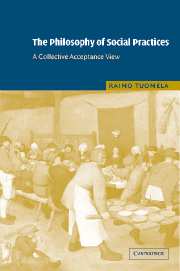Book contents
- Frontmatter
- Contents
- List of figures
- Acknowledgments
- Introduction
- 1 Collective intentionality and the construction of the social world
- 2 Collective intentionality
- 3 Conceptual activity, rule following, and social practices
- 4 An account of social practices
- 5 A Collective Acceptance account of collective-social notions
- 6 Social institutions
- 7 Social practices in a dynamic context: a mathematical analysis
- Epilogue
- Notes
- References
- Index
6 - Social institutions
Published online by Cambridge University Press: 22 September 2009
- Frontmatter
- Contents
- List of figures
- Acknowledgments
- Introduction
- 1 Collective intentionality and the construction of the social world
- 2 Collective intentionality
- 3 Conceptual activity, rule following, and social practices
- 4 An account of social practices
- 5 A Collective Acceptance account of collective-social notions
- 6 Social institutions
- 7 Social practices in a dynamic context: a mathematical analysis
- Epilogue
- Notes
- References
- Index
Summary
SOCIAL INSTITUTIONS INTRODUCED
In this chapter I will consider social institutions (or, as I would like to say, “collective-social” institutions) but mainly in a broad sense. They form the most important class of collective-social entities. Roughly speaking, by a social institution in the broad sense (e.g. money, language) I mean a specific type of norm-based – and possibly also aim-based – social practice. Roughly speaking, social institutions give or “define” the ground rules for how to act or for what counts as a collective item with a signified symbolic or social status in a society (or other collective). In this sense they are a kind of collective good available to all (cf. the forgroupness requirement). One can also say in more technical terms that institutions are special kinds of ordered pairs of social practices and norms (or systems of norms). This way of speaking emphasizes that there are two key elements in an institution – norms and collective activity, and the norms must confer a special symbolic or social status to the activity (or an item involved in the activity).
The notion of a social institution is used in several different senses in the literature. In different disciplines there are various ingrained usages and theorists often have different things in mind when speaking of institutions; and even when they have the same thing in mind they often emphasize different features of their shared analysandum.
- Type
- Chapter
- Information
- The Philosophy of Social PracticesA Collective Acceptance View, pp. 156 - 200Publisher: Cambridge University PressPrint publication year: 2002



